
Dr Michele Board, Professor Jane Murphy, with students Laura Wade, Neil Reid and Abigayle Travers Bu research assistant Rebecca Mitchell, with the team from Alzheimer’s Research UK

Rebecca Mitchell, Year 2 adult nursing students Laura Wade, Abigayle Travers and Neil Reid
A new training resource, launched yesterday (11 June) by Alzheimer’s Research UK and Bournemouth University, uses virtual reality to help healthcare professionals improve their understanding of the symptoms and challenges of dementia, and to help them develop enhanced relationships with people with the condition.
The Lived Experience of Dementia aims to enhance empathy and increase understanding of the lesser-known symptoms of dementia by enabling healthcare professionals to experience the everyday challenges faced by people living with the condition through innovative VR technology. From today, the first 1,000 training packs will be free to order from the charity’s website.
The resource is built around Alzheimer’s Research UK’s groundbreaking A Walk Through Dementia virtual reality app. The free app uses computer-generated environments and 360° video sequences to illustrate in powerful detail the symptoms and difficulties faced by people with dementia.
The Lived Experience of Dementia was developed following a comprehensive evaluation of the A Walk Through Dementia app as a training tool at Bournemouth University’s Ageing and Dementia Research Centre with nursing home staff and undergraduate students including physiotherapy, occupational therapy and adult, child, and mental health nursing students.
The evaluation showed that 81% of users said the app had challenged their perceptions of dementia and 92% had a greater insight into the challenges faced by people with dementia after using it. When asked, 93% of those who tested the app as part of the evaluation said they would recommend it to health and social care staff and family members of people with dementia.
After an introduction to a humanised approach to care, the training pack asks the user to undertake the VR app to follow Anne, who has dementia, as she goes shopping, walks back from the supermarket and makes a cup of tea at home. Each scenario links the challenges Anne faces to the user’s experiences in their working life, enabling them to reflect on how they can apply this insight when interacting with, and caring for, people with dementia.
The resource also incorporates commentary from people with dementia and their carers, including suggestions on the small changes healthcare professionals can make to enhance the care they provide.
The Lived Experience of Dementia is suitable for anyone who provides front-line care in an acute hospital, in the community or in a residential home setting, and covers a range of learning outcomes from the Dementia Training Standards Framework, supporting other learning materials covering Tier 2 standards.
Hilary Evans, Chief Executive of Alzheimer’s Research UK, said:
“With more than 850,000 people in the UK living with dementia and this number set to rise dramatically in coming years, we must do all we can to support those working on the front line of healthcare.
“The Lived Experience of Dementia is a uniquely powerful training tool, using innovative virtual reality approaches to give people first-hand experience of some of the challenges that those living with dementia face every day. Our aim is to harness this technology to provide a low-cost way for formal and informal carers to develop their own skills and widen their perspective of the complex experience of dementia.
“This has been a truly special project for us and we’re hugely grateful to our supporters whose experiences inspired the development of this important resource.”
Dr. Michele Board, Deputy Lead Ageing and Dementia Research Centre (ADRC) at Bournemouth University, said:
“When we first saw Alzheimer’s Research UK’s virtual reality dementia app, we were struck by its potential to drive more empathy than traditional training approaches. Our evaluation work shows that the VR approach leaves a lasting impact on learners and saw many users refer to their experiences in the app when faced with similar situations in their day-to-day work.
“People with dementia often find it difficult to communicate what they’re experiencing or how they need help. It’s only through truly stepping into someone’s shoes that you can develop really human-centred approaches to care. We hope this training tool will support healthcare professionals in their personal and professional development.”
Trina, living with posterior cortical atrophy – a rare form of Alzheimer’s disease – who fed into the development of the app and the training resource, said:
“When some people think about dementia they just think about memory problems, but it also affects people in lots of other ways. I’m delighted that my experiences and the experiences of people living with other forms of dementia have been used to develop this resource.
“We must talk about dementia more and do all we can to help people understand it.”
Attending the launch in London from BU were Dr Michele Board and Professor Jane Murphy; Rebecca Mitchell Research Assistant and 3 adult nursing students, Abigayle Travers, Laura Wade and Neil Reid. The students have participated in the evaluation, development of the workbook and support delivery of the training to other students, their active involvement throughout the project has been brilliant!
The Lived Experience of Dementia training packs, containing the workbook and virtual reality headset, can be ordered by visiting alzres.uk/lived-experience-dementia
The first 1,000 packs are free thanks to funding from Legal & General, a long-standing corporate partner of Alzheimer’s Research UK.

Drinks reception in London at the Launch of the workbook funded by legal and general

Workbook developed by BU to support the AWTD app

Undergraduate students in Kimmeridge Lecture Theatre viewing the AWTD app
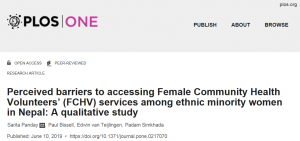 This week saw the publication of ‘Perceived barriers to accessing Female Community Health Volunteers’ (FCHV) services among ethnic minority women in Nepal: A qualitative study’ [1]. This article in the Open Access journal PLoS ONE highlights the key role volunteers play in delivering health services to minorities/the poorest people, especially in low-income countries like Nepal.
This week saw the publication of ‘Perceived barriers to accessing Female Community Health Volunteers’ (FCHV) services among ethnic minority women in Nepal: A qualitative study’ [1]. This article in the Open Access journal PLoS ONE highlights the key role volunteers play in delivering health services to minorities/the poorest people, especially in low-income countries like Nepal. This paper studies community health workers in Nepal, who are known as Female Community Health Volunteers (FCHVs). To address this issue, we conducted a qualitative study to explore perceived barriers to accessing maternal and child healthcare services among ethnic minority groups in two different parts of Nepal with varying degrees of access to local healthcare centres. Semi-structured interviews were conducted with twenty FCHVs, 26 women service users and 11 paid local health workers. In addition, 15 FCHVs participated in four focus group discussions.
This paper studies community health workers in Nepal, who are known as Female Community Health Volunteers (FCHVs). To address this issue, we conducted a qualitative study to explore perceived barriers to accessing maternal and child healthcare services among ethnic minority groups in two different parts of Nepal with varying degrees of access to local healthcare centres. Semi-structured interviews were conducted with twenty FCHVs, 26 women service users and 11 paid local health workers. In addition, 15 FCHVs participated in four focus group discussions.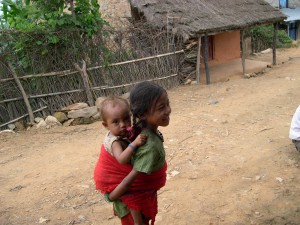 A thematic analysis of the data identified five major themes underlying barriers to accessing available maternal and child healthcare services by ethnic minority groups. These themes include: a) lack of knowledge among service users; b) lack of trust in volunteers; c) traditional beliefs and healthcare practices; d) low decision-making power of women; and e) perceived indignities experienced when using health centres. The paper concluded that community health programmes should focus on increasing awareness of healthcare services among ethnic minority groups, and the programmes should involve family members (husband and mothers-in-law) and traditional health practitioners. Both the FCHVs and local healthcare providers should be trained to communicate effectively in order to deliver respectful care among ethnic minorities if we want to achieve universal healthcare coverage for maternal and child health in low- and -middle income countries.
A thematic analysis of the data identified five major themes underlying barriers to accessing available maternal and child healthcare services by ethnic minority groups. These themes include: a) lack of knowledge among service users; b) lack of trust in volunteers; c) traditional beliefs and healthcare practices; d) low decision-making power of women; and e) perceived indignities experienced when using health centres. The paper concluded that community health programmes should focus on increasing awareness of healthcare services among ethnic minority groups, and the programmes should involve family members (husband and mothers-in-law) and traditional health practitioners. Both the FCHVs and local healthcare providers should be trained to communicate effectively in order to deliver respectful care among ethnic minorities if we want to achieve universal healthcare coverage for maternal and child health in low- and -middle income countries. NEW date 22 & 23 October 2019
NEW date 22 & 23 October 2019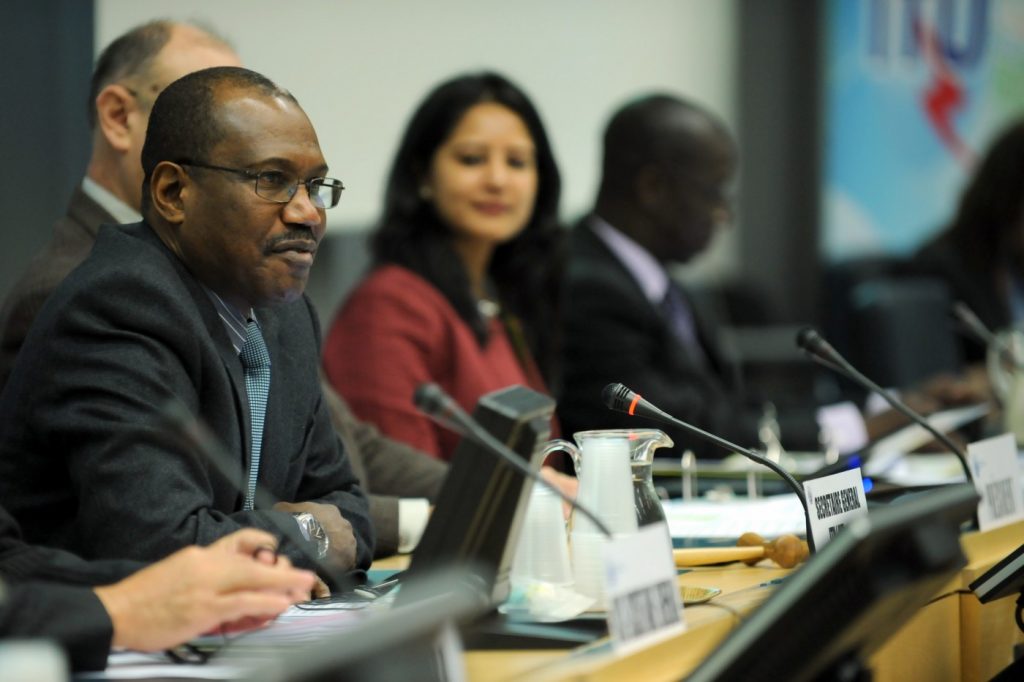






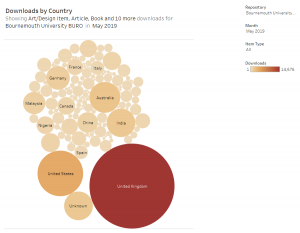

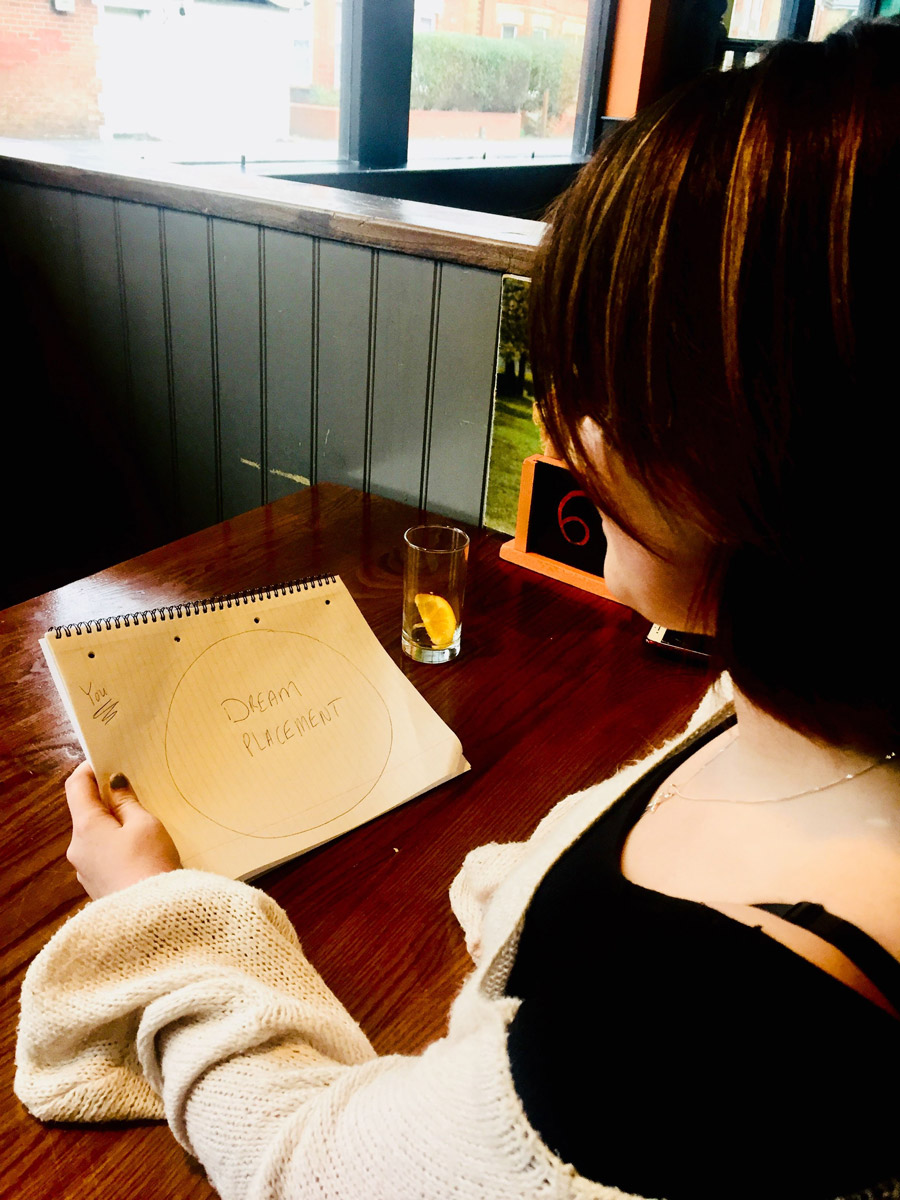
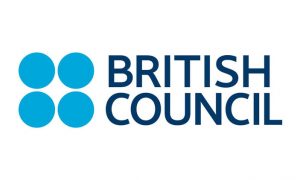
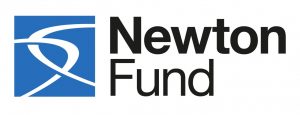



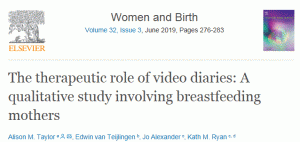
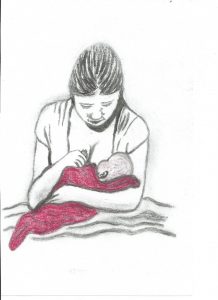

 Today sees the launch of Research England’s
Today sees the launch of Research England’s  Today sees the launch of Innovate UK’s
Today sees the launch of Innovate UK’s 










 Expand Your Impact: Collaboration and Networking Workshops for Researchers
Expand Your Impact: Collaboration and Networking Workshops for Researchers Visiting Prof. Sujan Marahatta presenting at BU
Visiting Prof. Sujan Marahatta presenting at BU 3C Event: Research Culture, Community & Can you Guess Who? Thursday 26 March 1-2pm
3C Event: Research Culture, Community & Can you Guess Who? Thursday 26 March 1-2pm UKCGE Recognised Research Supervision Programme: Deadline Approaching
UKCGE Recognised Research Supervision Programme: Deadline Approaching ECR Funding Open Call: Research Culture & Community Grant – Apply now
ECR Funding Open Call: Research Culture & Community Grant – Apply now ECR Funding Open Call: Research Culture & Community Grant – Application Deadline Friday 12 December
ECR Funding Open Call: Research Culture & Community Grant – Application Deadline Friday 12 December MSCA Postdoctoral Fellowships 2025 Call
MSCA Postdoctoral Fellowships 2025 Call ERC Advanced Grant 2025 Webinar
ERC Advanced Grant 2025 Webinar Update on UKRO services
Update on UKRO services European research project exploring use of ‘virtual twins’ to better manage metabolic associated fatty liver disease
European research project exploring use of ‘virtual twins’ to better manage metabolic associated fatty liver disease